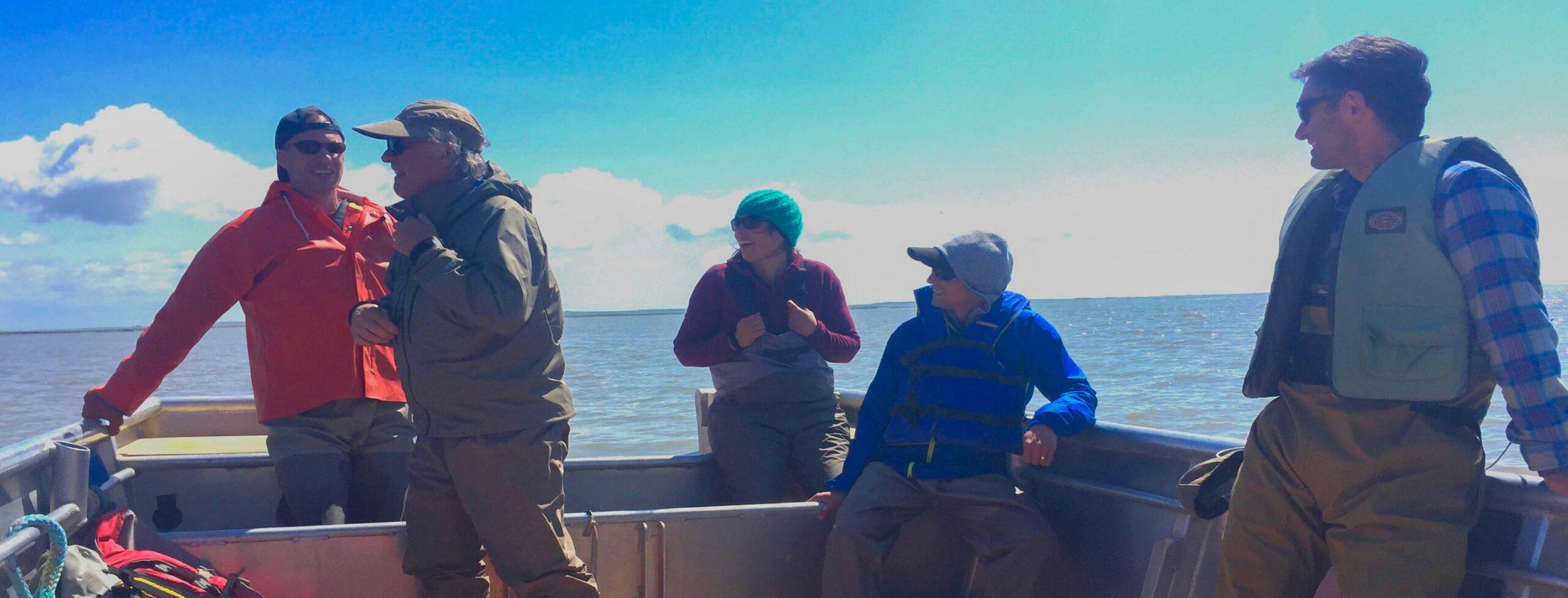
Executive Director
During a visit to Alaska, our executive director sees new opportunities for vanguard solutions from “the Great Land.”
Having been born and raised in East Coast cities, and then spending years working on global humanitarian issues, I hadn’t thought much about Alaska before I became executive director of Ecotrust. Jack London, the Iditarod, the Exxon Valdez, Sarah Palin — that was the collage that formed my mental image of what Alaska Natives called “the Great Land.”
I know I’m not alone among my fellow lower 48ers in that somewhat embarrassing, caricatured perception. That’s a shame, because I am beginning to see just how much Alaska matters.
I’m recently back from a two-week visit there that included an eye-opening stay with a fishing family in salmon-rich Bristol Bay, talking to advocates and funders in Anchorage, dining on king salmon with members of the Igiugig tribal village on Lake Iliamna, and trout-fishing in pristine waters across the state. Here are some things I found particularly interesting.
First off, the place is vast and wild on a scale you won’t see anywhere else in the United States. The mountains are massive, the forests feel endless, and there seems to be a bald eagle around every bend in the river. Alaska has more coastline than all other 49 states combined. Within this vast geography are intact ecosystems of global importance for fisheries, marine life, migratory birds, and terrestrial wildlife. I couldn’t help but think of Alaska as something of a global ecological engine room: if we mess it up, other systems can’t run.
Alaska’s value goes beyond its natural capital.
We are part of a nation that romanticizes a rugged, independent spirit, and Alaska is one place where that spirit still reigns supreme. There are restorative lessons for the rest of us (like, neighbors need to be able to depend on one another) in the way Alaskans live. But alongside that impressive self-reliance, there is some fragility.
“
I couldn’t help but think of Alaska as something of a global ecological engine room: if we mess it up, other systems can’t run.
Alaska is one of the most oil-dependent states in the United States. Roughly 85 percent of the state’s budget is funded by oil and gas revenues and about a third of Alaskan workers are employed by the oil and gas industry, so fluctuations in supply and price — whether driven by conservation decisions or competition from renewables or whatever else — have an outsized effect on people’s lives there. In a climate-constrained world, that dependence on a single industry reflects a fragility that should alarm anyone who cares about the region, and we need to support all Alaskans in building their economic resilience.
As dependent as it is on the oil and gas industry, the state is also feeling the painful effects of global warming, a highly relevant policy dilemma recently highlighted in a New York Times feature. How they manage that tension will be instructive for other regions; this problem is not going away on its own.
“
One day in Anchorage, an Alaskan social entrepreneur posed a pretty fascinating question: ‘What if Alaska could become a model for how we could live, how we balance these needs, instead of just staying stuck in the conservation versus extraction fight that is getting us nowhere?’
Beyond oil and gas, Alaska’s main export is seafood. Half of all U.S.-produced seafood — a renewable, carbon-friendly protein source for a growing, hungry world — comes out of Alaska, and the sockeye salmon run in Bristol Bay is the largest on the planet. Salmon is much more than an export commodity for Alaskans: salmon feeds families, provides jobs, connects islands to estuaries to inland watersheds, and for millennia has supported the ways of life of the state’s indigenous people. It would be hard to overstate the significance of salmon to Alaskans, and yet managing land and water for salmon habitat and for the extraction of non-renewable resources is incredibly challenging, as evidenced by the ongoing debate over the proposed Pebble Mine.
One day in Anchorage, an Alaskan social entrepreneur posed a pretty fascinating question: “What if Alaska could become a model for how we could live, how we balance these needs, instead of just staying stuck in the conservation versus extraction fight that is getting us nowhere?”

This “yes and” nexus, where solutions benefit the environment and the economy, and increase equity, is where Ecotrust works best. So I am pleased to report that Ecotrust is engaging more deeply in the state. We are working with two Native villages in southeast Alaska to involve the broader community in the land and watershed management decisions that affect them. Check out a blog post on that by my colleague Jon Bonkoski here. We are helping our partner, the Southeast Sustainable Partnership, assess the impact of its work building cultural, ecological, and economic prosperity in that part of the state. Our recently hired Anchorage-based fisheries lead, Kelly Harrell, has spent years promoting thriving coastal communities and protecting Alaska’s marine ecosystems, and she is working hard to bring Ecotrust’s assets to bear for her neighbors throughout the state.
Building on a long history of working partnerships — from helping to establish the Prince William Sound Science Center in the wake of the Exxon Valdez oil spill, to working with local communities to improve fisheries management in the Copper River watershed, to honoring Alaska Native leaders through the Indigenous Leadership Award — we are energized by the opportunities in Alaska and we are seeking partners of all types to be part of that effort. Let’s do this together.

Website
As a member of Southeast Sustainable Partnership, Ecotrust connects resources, people, ideas, and networks across Southeast Alaska.